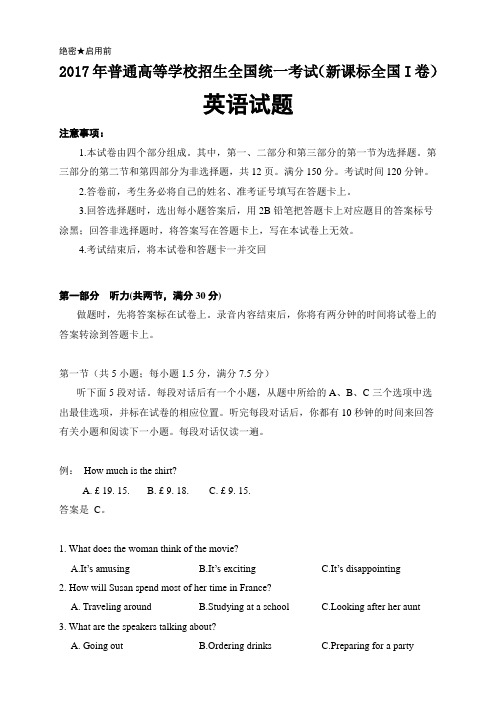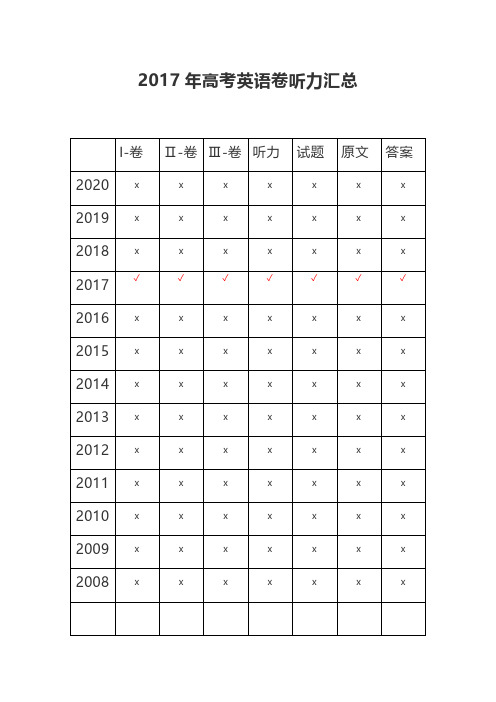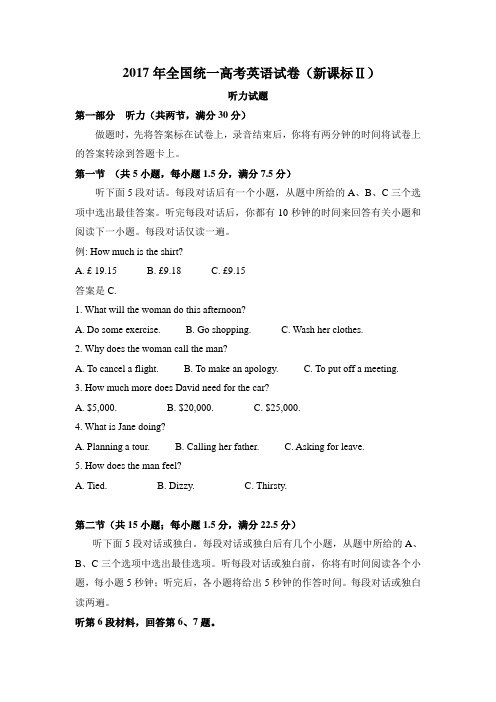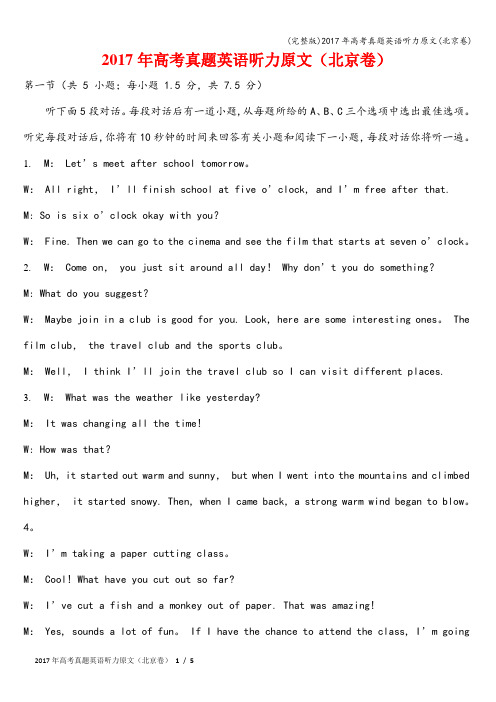2017英语试卷听力录音材料
2017年高考英语全国卷1卷(附参考答案、听力材料)

绝密★启用前2017年普通高等学校招生全国统一考试(新课标全国I卷)英语试题注意事项:1.本试卷由四个部分组成。
其中,第一、二部分和第三部分的第一节为选择题。
第三部分的第二节和第四部分为非选择题,共12页。
满分150分。
考试时间120分钟。
2.答卷前,考生务必将自己的姓名、准考证号填写在答题卡上。
3.回答选择题时,选出每小题答案后,用2B铅笔把答题卡上对应题目的答案标号涂黑;回答非选择题时,将答案写在答题卡上,写在本试卷上无效。
4.考试结束后,将本试卷和答题卡一并交回第一部分听力(共两节,满分30分)做题时,先将答案标在试卷上。
录音内容结束后,你将有两分钟的时间将试卷上的答案转涂到答题卡上。
第一节(共5小题;每小题1.5分,满分7.5分)听下面5段对话。
每段对话后有一个小题,从题中所给的A、B、C三个选项中选出最佳选项,并标在试卷的相应位置。
听完每段对话后,你都有10秒钟的时间来回答有关小题和阅读下一小题。
每段对话仅读一遍。
例:How much is the shirt?A. £ 19. 15.B. £ 9. 18.C. £ 9. 15.答案是C。
1. What does the woman think of the movie?A.It’s amusingB.It’s excitingC.I t’s disappointing2. How will Susan spend most of her time in France?A. Traveling aroundB.Studying at a schoolC.Looking after her aunt3. What are the speakers talking about?A. Going outB.Ordering drinksC.Preparing for a party4. Where are the speakers?A.In a classroomB.In a libraryC.In a bookstore5. What is the man going to do ?A.Go on the InternetB.Make a phone callC.Take a train trip第二节(共15小题;每小题1.5分,满分22.5分)听下面5段对话或独白。
2017年高考英语全国1-2-3卷听力汇总(录音+原文+答案)

2017年高考英语卷听力汇总2017年高考英语全国1卷听力(录音+原文+答案)听力下载链接:https:///s/1HBFPEISp-kg2XSPCn2216g提取码:12342017全国Ⅰ卷2017年全国Ⅰ卷第一部分听力(共两节,满分30分)做题时,先将答案标在试卷上。
录音内容结束后,你将有两分钟的时间将试卷上的答案转涂到答题卡上。
第一节(共5小题;每小题1.5分,满分7.5分)听下面5段对话。
每段对话后有一个小题,从题中所给的A、B、C三个选项中选出最佳选项。
听完每段对话后,你都有10秒钟的时间来回答有关小题和阅读下一小题。
每段对话仅读一遍。
例:How much is the shirt?A. £19.15.B. £9.18.C. £9.15.答案是C。
1.What does the woman think of the movie?A. It’s amusing.B. It’s exciting.C. It’s disappointing.2.How will Susan spend most of her time in France?A. Traveling around.B. Studying at a school.C. Looking after her aunt.3.What are the speakers talking about?A. Going out.B. Ordering drinks.C. Preparing for a party.4.Where are the speakers?A. In a classroom.B. In a library.C. In a bookstore.5.What is the man going to do ?A. Go on the Internet.B. Make a phone call.C. Take a train trip.第二节(共15小题,每小题1.5分,满分22.5分)听下面5段对话或独白。
2017年四川省成都市中考英语试题+参考答案+听力材料+听力mp3

成都市二O 一七年高中阶段教育学校统一招生考试(含成都市初三毕业会考)英语试题(满分150分,考试时间120分钟)A 卷(共100分)第一部分听力(共30小题;计30分)一、听句子,根据所听到的内容选择正确答案。
每小题念两遍。
(共5小题,每小题1分;计5分)( ) 1. A. Yes, she can. B. Yes, she does. C. Yes, she is. ( ) 2. A. It is. B. I see. C. Thank you. ( ) 3. A. Yo u’re welcome. B. You’re right. C. You’re kind.( ) 4. A. For an hour. B. Once a week. C. In a week. ( ) 5. A . Sure. It’s my magazine.A. Sure. It’s my magazine.A. Sure. It’s my magazine.B. Sure, you could. B. Sure, you could. C. Sure. Here you are. 二、听句子,选择与所听句子内容相符合的图片。
每小题念两遍。
(共(共5小题,每小题1分;计5分)A. B. C. D. E. 6.______ 7.______ 8.______ 9.______ 10.______ 三、听对话,根据对话内容及问题选择正确答案。
每小题念两遍。
(共(共10小题,每小题1分;计10分)( )11. A. She is short.B. She has curly hair. C. She wears glasses. ( )12. A. At 10:00 pm. B. At 10:30 pm. C. At 11:00 pm. ( )13. A. One. B. Two. C. Three. ( )14. A. Wonderful. B. Cute. C. Excited. ( )15. A. Big Screen. B. Town China. C. Movie World. ( )16. A. In the bookstore. B. In the reading room. C. In the library. ( )17. A. The nature museum. B. The art museum. C. The science museum. ( )18. A. S he went to the water park. She went to the water park. B. She went to the countryside. C. She went to her grandparents.( )19. A. Twenty. B. Fifteen. C. Five. ( )20. A. He’s cleaning his room.B. He’s playing a game.C. He’s watching TV .四、听短文,根据短文内容选择正确答案。
2017年全国统一高考英语试卷听力+原文+答案(新课标Ⅱ、Ⅲ)

2017年全国统一高考英语试卷(新课标Ⅱ)听力试题第一部分听力(共两节,满分30分)做题时,先将答案标在试卷上,录音结束后,你将有两分钟的时间将试卷上的答案转涂到答题卡上。
第一节(共5小题,每小题1.5分,满分7.5分)听下面5段对话。
每段对话后有一个小题,从题中所给的A、B、C三个选项中选出最佳答案。
听完每段对话后,你都有10秒钟的时间来回答有关小题和阅读下一小题。
每段对话仅读一遍。
例: How much is the shirt?A. £ 19.15B. £9.18C. £9.15答案是C.1. What will the woman do this afternoon?A. Do some exercise.B. Go shopping.C. Wash her clothes.2. Why does the woman call the man?A. To cancel a flight.B. To make an apology.C. To put off a meeting.3. How much more does David need for the car?A. $5,000.B. $20,000.C. $25,000.4. What is Jane doing?A. Planning a tour.B. Calling her father.C. Asking for leave.5. How does the man feel?A. Tied.B. Dizzy.C. Thirsty.第二节(共15小题;每小题1.5分,满分22.5分)听下面5段对话或独白。
每段对话或独白后有几个小题,从题中所给的A、B、C三个选项中选出最佳选项。
听每段对话或独白前,你将有时间阅读各个小题,每小题5秒钟;听完后,各小题将给出5秒钟的作答时间。
每段对话或独白读两遍。
听第6段材料,回答第6、7题。
(完整版)2017年高考真题英语听力原文(北京卷)

2017年高考真题英语听力原文(北京卷)第一节(共 5 小题;每小题 1.5 分,共 7.5 分)听下面5段对话。
每段对话后有一道小题,从每题所给的A、B、C三个选项中选出最佳选项。
听完每段对话后,你将有10秒钟的时间来回答有关小题和阅读下一小题,每段对话你将听一遍。
1. M:Let’s meet after school tomorrow。
W: All right,I’ll finish school at five o’clock, and I’m free after that.M: So is six o’clock okay with you?W:Fine. Then we can go to the cinema and see the film that starts at seven o’clock。
2. W: Come on, you just sit around all day!Why don’t you do something?M: What do you suggest?W: Maybe join in a club is good for you. Look, here are some interesting ones。
The film club, the travel club and the sports club。
M: Well,I think I’ll join the travel club so I can visit different places.3. W: What was the weather like yesterday?M: It was changing all the time!W: How was that?M: Uh, it started out warm and sunny, but when I went into the mountains and climbed higher, it started snowy. Then, when I came back, a strong warm wind began to blow。
听力材料(含试音)

2018年杭州市初中毕业升学模拟考试英语听力材料这是2017年杭州市初中毕业升学文化考试英语听力部分考试,现在是试音时间。
W: You look worried, Paul.M: I am, Ms. Manson. I’m having trouble learning English.W: You said you liked English. What’s the problem?M: I can’t get the pronunciation right.W: Well, listening can help. Why don’t you listen to English songs on the radio and repeat the difficult words?M: That’s a good idea. But what about all the new words? I forget a lot of the new w ords.W: You can always write the new words in your notebook and review them from time to time. You can even study on the way to school.M: That might really help! Thanks.W: Can you understand when people talk to you?M: Well, not always. Sometimes I just don’t understand what people are saying.W: Why don’t you join an English language club to practice speaking English? The English club meets after school on Tuesdays and Thursdays.M: Maybe I’ll go. The only other problem is that I don’t get much writing practice.W: Maybe you should find a pen pal.M: That sounds like a fun way to practice writing. Thanks, Ms. Manson.试音到此结束。
2017秋大学英语(1-2)B级月考1试卷A mp3 听力文稿

Tapescript of Model Test 2Section ANews Report OneGot a smart phone? Never lose your hotel key, or even have to stop at the registration desk again. That’s the vision of a hotel chain that plans to send digital keys to guests’ phone via an app instead of making them check in and get the traditional plastic swipe cards. [1]Arriving guests could get around the front desk and go straight to their rooms. Starwood Hotels & Resorts, which owns more than 1,150 hotels in nearly 100 countries, [2]plans to install the system in the next three months at two of its hotels in the U.S.A. If all goes well, the company says it could have the feature in all of its hotels by next year. A spokeswoman said the app will initially be compatible with recent iPhone models and newer Android phones. The app will use Bluetooth technology to unlock the room with a tap.Questions 1 and 2 are based on the news report you have just heard.1. What is the main advantage of the digital key?2. How many hotels will have the system in the next three months?News Report TwoA British man accused of planning his wife’s murder while they were honeymooning in South Africa has lost a High Court appeal to block his being sent back to Britain until he is fit to [3]The judges ruled that Shrien Dewani can be sent back as long as the South African government pledges to return him to the United Kingdom should he ultimately prove unfit to be tried. Dewani’s lawyers had urged that he should not be sent back while he was unfit to stand trial. He is being treated for a depressive illness. His legal team can appeal the decision at the Supreme Court. [4]Dewani is accused of hiring a crew of criminals to killhis wife, AnniDewani, during a taxi ride in Cape Town last November, just over two weeks after their wedding.Questions 3 and 4 are based on the news report you have just heard.3. What can we learn about Shrien Dewani according to the court ruling?4. What was Dewani accused ofNews Report ThreeDozens of children at a Utah elementary school had their lunch trays taken away from them before they could take a bite this week. Salt Lake City School District officials said the trays were taken way at Utah Elementary School Tuesday [5]because some students had negative balances in their accounts used to pay for lunches. But they admit the situation should have been handled differently. Instead of regular lunches, the students were given fruit and milk. “We don’t ever let kids go without any food entirely,” said Salt Lake City Schoo l District spokesman Jason Olsen. [6]One mother said, she was “blindsided” when her daughter described what a school district official told her: “You don’t have any money in your account, so you can’t get lunch.”“There were a lot of tears,” she said, “and it was pretty upsetting for them.” [7]The district said it started notifying parents about negative account balances Monday. But the mother said she and other parents were never told about the problem.Questions 5 to 7 are based on the news report you have just heard.5. Why were some children offered only fruit and milk for lunch?6. How did parents react to the school’s way of handling the situation?7. When were the parents informed of negative balances according to the district? Section BConversation OneM: Hi, Diana. I’m surprised to see you on the city bus. Your car in the shop? W: No. [8][11]I’ve just been thinking a lot about the environment lately. So I decide the air will be a lot cleaner if we all use public transport when we could. M: I’m sure you are right. The diesel bus isn’t exactly pollution free.W: True. They’ll be running a lot cleaner soon. [9]We were just talking about that in my environmental engineering class.M: What could the city do? Install pollution filters in all their buses?W: They could, but those filters make the engines work harder and really cut down on the fuel efficiency. Instead, they found a way to make their engines more efficient.M: How?W: Well, there is a new insulator. And you spray a thick coat of it on the engine. M: An insulator?W: Yeah. [10]What it does is reflect back the heat of burning fuel. So the fuel will burn much hotter and burn up more completely.M: So a lot less unburned fuel comes out to pollute the air.W: And the bus will need less fuel. So with the saving on fuel cost, they say this will all pay for itself in just six months.Questions 8 to 11 are based on the conversation you have just heard.8. Why does Diana take a bus that day?9. What is true about Diana?10. What justifies the installation of a new insulator in the buses according to Diana?11. What is the major concern of the woman?Conversation TwoM: Hi. I have a reservation for tonight. My name is Charles Nelson.W: Okay, Mr. Nelson. That’s a room for five under your name.M: No. No. Hold on. There must be some mistake.W: Okay. Let’s check this again. Okay, Mr. Charles C. Nelson for tonight.M: Ah. That’s the problem. [12]My name is Charles Nelson, not Charles C.Nelson. You must have two guests under the name.W: Okay. Let me check this again. Oh! Okay, here we are. Charles Nelson. A room for one for the 19th.M: Wait, wait! It’s for tonight, not tomorrow night.W: Hum. Hum. I don’t think we have any rooms fo r tonight. [13]There’s a convention going on in town, and uh, let’s see. Yeah, no rooms. Well. [14]We do have some rooms under renovation with just a roll-away bed. None of the normal stuff like a TV or working shower or toilet.M: Ah, madam. Come on. There must be something else.W: Well, let me check my computer here. Ah! There has been a cancellation for this evening. A honeymoon suite is now available.M: Great. I’ll take it.W: [15]But I’ll have to charge you two hundred fifty dollars for the night.M: Ah, madam. I should get a discount for the inconvenience.W: Well, [15]the best I can give you is a ten percent discount plus a ticket for a free continental breakfast.Questions 12 to 15 are based on the conversation you have just heard.12. What was the first problem with the man’s reservation?13. Why was it hard to get a room that day?14. What do we know about the rooms under renovation in the hotel?15. What did the man get finally?Section CPassage OneTelevision now plays such an important part in so many people’s lives that it is essential for us to try to decide whether it is a blessing or a curse. Obviously television has both advantages and disadvantages. But do the former outweigh the latter?In the first place, television is not only a convenient source of entertainment, but also a comparatively cheap one. They just sit comfortably at home and enjoy endless series of programs rather than to go out in search of amusement elsewhere. Some people, however, maintain that this is precisely where the danger lies.[16]The television viewer needs to do nothing. He is completely passive and has everything presented to him without any effort on his part. Secondly, television keeps one informed about current events, allows one to follow the latest developments in science and politics. Yet here again there is a danger. The television screen itself has a terrible, almost physical fascination for us. [16]We get so used to looking at its movements, so dependent on its pictures that it begins to dominate our lives. There are many other arguments for and against television.[16]The poor quality of its program is often criticized. But it is undoubtedly a great comfort to many lonely elderly people. And does it corrupt or instruct our children? [17]I think we must realize that television in itself is neither good nor bad.[18]It is the uses to which it is put that determine its value to society.Questions 16 to 18 are based on the passage you have just heard.16. What is NOT mentioned as the disadvantages of TV?17. What is the speaker’s opinion on television?18. What determines the value of television to society?Passage TwoBeethoven probably began to go deaf in 1797, but he tried to keep it a secret while consulting doctors and trying various remedies, such as the application of almond oil. [19]He was extremely anxious about its possible effect on his career as a musician, and embarrassed by its effect on his social life. In the summer of 1801 he wrote to two friends expressing the anxiety that his best years would pass “without my being able to achieve all that my talent and my strength have commanded me to do”. Although tempted to kill himself, “the only thing that held me back was my art. For indeed it seemed to me impossible to leave this world before I had produced all the works that I felt the urge to compose”. It could be argued that Beethoven’s deafness helped the developm ent of his art: isolated from the world, and unable to perform, he could devote all his time to composing.[20]In 1804 his friend Stephan von Breuning, with whom he briefly shared lodgings, wrote to Franz Wegler about the terrible effect his gradual loss of hearing was having on Beethoven: it had caused him to distrust his friends, and he was becoming very difficult to be with. But above all else, Beethoven was dedicated to his art and the urge to compose remained with him throughout his life. [21]It may be that he shielded away from the commitment of marriage because he knew it would interfere with his art.Questions 19 to 21 are based on the passage you have just heard.19. Why did Beethoven try to conceal his going deaf?20. What was the result from Beet hoven’s gradual loss of hearing in 1804?21. What do we know about Beethoven in this passage?Passage ThreeOver the years, new technologies have changed farming. Change in a general direction is a trend. Yet people often recognize trends only when they consider the past. Today, we look back at some trends in American agriculture. [22]In 1920, America had more than 25 million horses and mules. Most were used for farm work. [22]Around the same time, a competitor began to appear in large numbers. Tractors could turn soil, pull loads and speed harvests — and they could do it better. More tractors meant fewer horses and mules. [23]By the 1960s, the numbers of these work animals settled to where they remain today. That is about one-tenth the levels in 1920. Yet even the demand for tractors had its limits. Their numbers have been slowly decreasing since 1982. Experts say farmers can do more with less now because of new technologies. As tractors replaced horses and mules, farmers no longer needed to raise crops to feed work animals. Oats have long been food for horses and mules. In 1954, American farmers planted over sixteen million hectares of oats. By 2000, that was down to less than one million hectares. So what did the farmers do with the extra land? More and more farmers began to plant a new crop around the same time that the tractor became popular. It was the soybean. The soybean is one of the oldest plants harvested. Yet it was not planted widely in the United States until the 1920s. By the year 2000, close to 30 million hectares were planted with soybeans. [24]It is the nation’s mostimportant crop for high-protein animal feed and for vegetable oil.[25]In fact, soybeans are the second most valuable crop grown by American farmers after corn. Much of the soybean production goes to exports.Questions 22 to 25 are based on the passage you have just heard.22. In which year did tractors begin to appear in large numbers?23. How many horses and mules did America have in the 1960s?24. What is America’s most important crop for high-protein animal feed and for vegetable oil?25. What is the most valuable crop grown by American farmers?。
2017年3月PETS听力真题试题及录音材料

全国英语等级考试第二级2017年3月试题第一节听下面5段对话。
每段对话后有一个小题,从题中所给的A、B、C三个选项中选出最佳选项,并标在试卷的相应位置。
听完每段对话后,你都有10秒钟的时间来回答有关小题和阅读下一小题。
每段对话仅读一遍。
1.Whatisthewomangoingtodo?A.Haveacoffee.?B.Cleanheroffice.C.Attendameeting.2.Whatdoesthewomanaskfor?A.Adressofdifferentsize.B.Adressofbetterquality.C.Adressofabrightcolor.3.Whatdoesthemanwanttodo?A.Borrowaladder.B.Takehisleave.C.Cleantheroof.4.Whatwillthewomanprobablydonext?A.Gototheman’splace.B.CalltheHillsboroHotel.C.Reserveanexhibitionhall.5.Wherearethespeakers?A.Athome.B.Inamuseum.C.Inthecitysquare.第二节听下面5段对话或独白。
每段对话或独白后有2至4个小题,从题中所给的A、B、C三个选项中选出最佳选项,并标在试卷的相应位置。
听每段对话或独白前,你将有5秒钟的时间阅读各个小题;听完后,各小题将给出5秒钟的作答时间。
每段对话或独白读两遍。
?听下面一段对话,回答第6和第7题。
6.Whyhasthemanhardlyseenthewomanlately?A.Shehadatrafficaccident.B.Shemovedtoanotherplace.C.Sheisworkingunusualhours.7.Wheredoestheconversationtakeplace?A.Inanoffice.B.Atabusstop.C.Inanapartment.听下面一段对话,回答第8至第10题。
